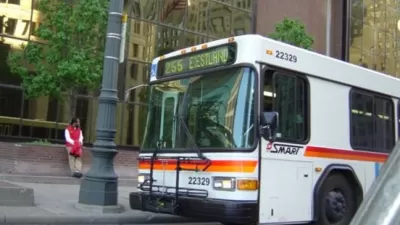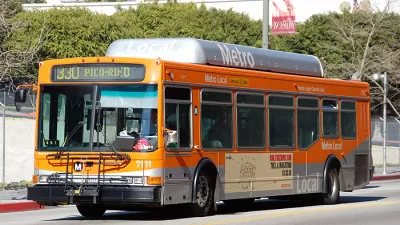The Los Angeles County Metropolitan Transportation Authority will let low-income residents and K-12 students ride for free starting in January 2022.

In an attempt to study the potential for switching to a fare-free system, the Los Angeles County Metropolitan Transportation Authority (Metro) is implementing a two-phase pilot program that will let low-income riders ride for free. Ryan Fonseca reports on the plan, which is projected to save commuters up to $1,200 per year. According to Metro, "about 70% of its current riders earn less than $35,000 annually and would qualify for free fares under the current proposal." The second phase of the proposed program, set to launch in August 2022, would extend free fares to K-12 students. Los Angeles Mayor Eric Garcetti praised the proposal, saying "it's time for us to treat public transit as a public good."
Transit activists, meanwhile, argue that public transit was meant to be a public good all along, and that the proposed program doesn't go far enough to reduce the burden of transit costs for low-income Angelenos. Additionally, segmenting riders and requiring documentation to qualify for the program will likely exclude many qualifying residents. City Councilmember Mike Bonin expressed his concerns about the administrative costs: "I think we need to think about and be very realistic about whether or not the administrative burden of trying to separate 30% of the people [making] above $35K is so burdensome, that it isn't even worth it." Although the program will lead to revenue loss for the agency, fare revenue only makes up 4% of Metro's annual budget.
FULL STORY: Most LA Metro Riders Could Ride For Free Starting Next Year Under New Pilot Plan

Planetizen Federal Action Tracker
A weekly monitor of how Trump’s orders and actions are impacting planners and planning in America.

Chicago’s Ghost Rails
Just beneath the surface of the modern city lie the remnants of its expansive early 20th-century streetcar system.

San Antonio and Austin are Fusing Into one Massive Megaregion
The region spanning the two central Texas cities is growing fast, posing challenges for local infrastructure and water supplies.

Since Zion's Shuttles Went Electric “The Smog is Gone”
Visitors to Zion National Park can enjoy the canyon via the nation’s first fully electric park shuttle system.

Trump Distributing DOT Safety Funds at 1/10 Rate of Biden
Funds for Safe Streets and other transportation safety and equity programs are being held up by administrative reviews and conflicts with the Trump administration’s priorities.

German Cities Subsidize Taxis for Women Amid Wave of Violence
Free or low-cost taxi rides can help women navigate cities more safely, but critics say the programs don't address the root causes of violence against women.
Urban Design for Planners 1: Software Tools
This six-course series explores essential urban design concepts using open source software and equips planners with the tools they need to participate fully in the urban design process.
Planning for Universal Design
Learn the tools for implementing Universal Design in planning regulations.
planning NEXT
Appalachian Highlands Housing Partners
Mpact (founded as Rail~Volution)
City of Camden Redevelopment Agency
City of Astoria
City of Portland
City of Laramie





























